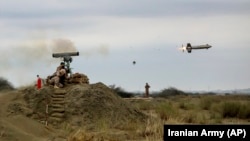Iran's military tested new attack drones in the coastal area of the Gulf of Oman and near the strategic Strait of Hormuz on Saturday as part of its ongoing annual drill, state TV reported.
Meanwhile, anti-government protests underway for more than three months continued. Videos on social media showed protests in Tehran's grand bazaar and several cities and towns including in the Kurdish area. Part of Tehran's bazaar closed in the wake of the protests, which authorities cracked down on.
State TV said the Ababil-5 attack drone was used during war games for the first time and successfully hit its target with a bomb after traveling 400 kilometers. Iran has tested many other military drones over the past decade.
The military drones have been a point of contention between Iran and the United States and its allies, which claim Tehran is supplying Moscow with drones that have been used in attacks in West-backed Ukraine.
During Iran’s war games, its military launched a drone to warn off a reconnaissance plane trying to approach the exercises on the Gulf coast, the semi-official Fars news agency said Saturday.
The report did not specify the nationality of the reconnaissance aircraft, but Iranian forces have had repeated similar confrontations with U.S. forces in the Gulf.
The U.S. Departments of Defense and State did not immediately respond to requests for comment.
In November, Iran acknowledged it has supplied Russia with drones, adding that the supply came before Moscow's war in Ukraine. Iran says it is committed to stopping the conflict.
The Strait of Hormuz is at the mouth of the Persian Gulf and is crucial to global energy supplies, with about a fifth of all oil traded at sea passing through it.
Commandos and airborne infantry participated in the war games, dubbed “Zolfaghar-1401,'' along with fighter jets, helicopters, military transport aircraft and submarines. Iran's military will fire missiles and test air defense systems as well. Iran regularly holds such drills to improve its defensive power and test weapons.
Since mid-September, Iran has been shaken by anti-government protests which were ignited by the death of a woman who was detained by the country's morality police. The demonstrations rapidly escalated into calls for an end to more than four decades of the country's clerical rule.
More than 500 protesters have been killed and more than 18,500 people have been arrested, according to Human Rights Activists in Iran, a group that has closely monitored the unrest. Iranian authorities have not released figures for those killed or arrested.










